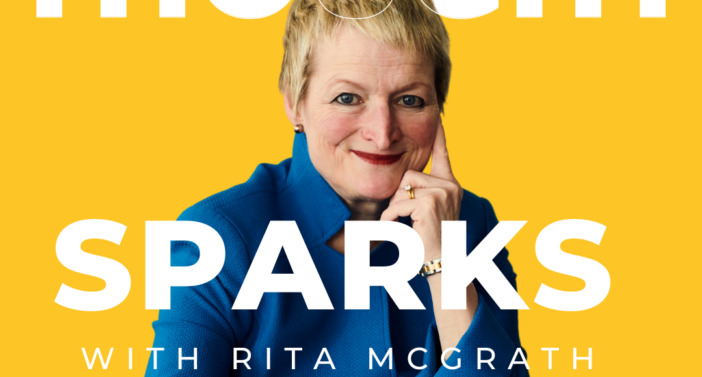
Peter Sims, author of the new book “Black Sheep: The Quest to be Human in an Inhuman Time” regularly convenes a group of artists, thought leaders, inventors, and authors to chat about how we might spark a human, artistic renaissance in America. Here are some ideas that came out of February’s gathering.
An unconventional television series about unconventional entrepreneurs
Filmmaker Farhoud Meybodi offered an overview of his approach to both rethinking how movies are produced and his topic – which is to spark large-scale solutions to the climate emergency by telling human stories of entrepreneurs in some of the most disadvantaged places. His thesis, which is fascinating, is that most efforts to get people to take action on climate-related topics is misguided. In provoking people to feel afraid, films such as “2012” or “The Day After Tomorrow” stimulate the release of cortisol, a fear transmitter, in people. The result? We feel uncomfortable and aroused, but that very quickly transforms into apathy. Instead, he suggests, “As storytellers, we must shift our focus toward instilling a sense of joy and empowerment in people’s choices, while also cultivating a bold vision of what a low-carbon future could look like.” Love, he argues, is the only thing that will really inspire behavioral change.
He also argues that many people who care about the environment are in an echo chamber of talking to one another. Instead, we need ways to reach out to people who are not currently engaged in a way they can relate to. After all, Meybodi notes, “The big bang and let there be light are the same thing.” I never thought about that before.
The first of 6 planned documentaries features the inspiring story of Nzambi Matee, an innovator, scientist, and entrepreneur who is creating building blocks out of plastic waste. Her company, Gjenge Makers, is several years old now and hopes to start a movement across Africa (and elsewhere). You can watch a cool video about the company here. The trailer for the “Earthbound” series is here. Have a look – it’s truly inspiring.
Other shared stories
Kenyon (KYN) Adams shared reflections on the killing of Trayvon Martin and its aftermath in which many felt that justice was betrayed. He is an artist and a coach to other artists and one of his works is called “Prayers of the People” a ritual chant of Dr. Martin Luther King Junior’s “letter from a Birmingham jail.” It’s very moving to hear it in this form. To listen to a recording of Dr. King reading the letter himself, click here.
It was great to reconnect with the amazing Billie Whitehouse, the CEO and Creative Director of a company called Wearable X (for wearable experiments). She is at the cutting edge of combining hardware, software, and fabrics to create smart wearable apparel. One of her early products was called Fundawear – haptic-enabled vibrating underwear for couples in long-distance relationships. Brilliant! Since then she’s worked on many problems that haptically equipped clothing can solve – among the latest is Nadi X, yoga pants that can actually coach you through your moves. Pretty cool.
Jon Leland, Chief Strategy Officer of Kickstarter and celebrated as one of CNN’s top 12 risk takers in business opened up a discussion about how Kickstarter, as a public benefit corporation, seeks to drive how much benefit it can put into the world. In their case, they’ve supported over 250,000 people working to bring their creative projects to life. The company was one of the first to embrace a four-day work week (fancy that in this era of forced return-to-work messages!). That got a lively discussion going about how the next wave of technology might emerge in ways that could crack open the current dominance of the big platform companies.
Alexandra Wicksell interviewed Peter Sims about the new book. It takes a very personal journey through Peter’s life and the creation of the BLK SHP vision, which as the book says, is to “help advance a new era of American enlightenment, deeply engaged and willing to lock arms in collaboration with brothers & sisters from all races, religions and sexual orientations to help catalyze a renaissance of creativity, entrepreneurship, invention and innovation…” The book takes us through the journey, inspired by Pixar’s Ed Catmull, of what Peter hopes will be a movement – going from I to we to us, eventually. Stay posted for updates.
Hamish Forsyth of OneLeap (an unusual consulting company with such a brilliant approach that they were featured in HBR) gave a stunning introduction to his short talk in Maori, the language of the indigenous people of New Zealand. He commented on the challenges of leading in times of unbounded uncertainty and potentially convening key people to create a set of operating principles for what comes next.
Open Mic night
While it wasn’t exactly “Don’t Tell Mama’s,” the attendees enjoyed sharing their stories with one another at an open mic session. Stories included a goat longing to be a unicorn, how even damaged lions could become immensely powerful and an emergency harmonica (you kind of had to be there).
This picture captures the spirit of the afternoon – and it was quite hilarious because we were all herded out to where the picture was to be taken, and lined up appropriately, only to forget that someone needed to actually take the picture. You’ll see just about everybody mentioned in this note here.
Up next: Ed Catmull’s story
The conference (or as Peter likes to say, the atmosphere of a wedding without the formal ceremony) wrapped up with a delightful conversation between Ed and Peter, which perhaps I’ll address in a future Thought Spark.
